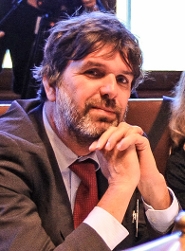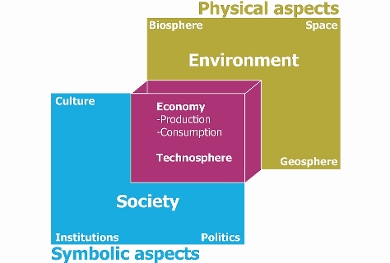
Circular economy essential to keep the earth turning
A circular economy in which all resources are reused is a prerequisite for a sustainable world. As EU president, the Netherlands can give a firm impetus to this economic shift. This is the message of Leiden Professor of Industrial Ecology, Arnold Tukker, in his inaugural lecture on 26 February.

There can be no doubt, Tukker explains, that a collective move to a circular economy is essential for a sustainable world. Tukker, who is also President of the Executive Board of the Leiden-Delft-Erasmus Centre for Sustainability (CfS) and Director of the Leiden Institute of Environmental Sciences (CML), makes the point that our planet is facing enormous challenges. The world population will continue to grow for the foreseeable future and almost all countries want their economy and prosperity to do the same. ‘That makes it extremely difficult to reduce carbon emissions to the levels agreed during the climate summit in Paris,’ Tukker warns.
The trap of perpetual motion
A circular system means that far fewer primary resources are needed for society to be able to function because the materials we use are recycled as much as possible. That’s a much bigger picture than occasionally opting for recycled toilet paper. ‘To put it simply, a circular economy based on 80 per cent re-use can be around five times the size of its linear counterpart, using the same amount of primary resources,’ Tukker explains. Nonetheless, unlike some other experts, he doesn’t intend to get caught up in the trap of perpetual motion. ‘Fossil energy, that accounts for around 20 per cent of our material use, can only be burned once. Eventually we will have to move to a completely sustainable energy system.’

Dutch influence
Tukker realises that switching to a circular economy is not going to happen overnight: ‘We need to get started as soon as possible and plan for the future. If we build circularity into our systems now, particularly in countries with emerging economies, we will create a sustainable basis for future recycling.’ He sees it as a positive development that Frans Timmermans, Vice-President of the European Union, launched a circularity package a few months ago. There is also the cautious hope that the Netherlands will put circularity high on the political agenda while it holds the presidency of the EU.
Global material flows
And in the meantime, the scientific world is of course not standing still. Over the coming period, Tukker and the research teams from CfS and CML will be charting the global flows of materials. The aim is to set up as many comprehensive databases as possible that can combine to make predictions, for example about the transport and use of solar cells or critical issues that jeopardise efficiency.
Powerful partnership
Tukker is very enthusiastic about this partnership: ‘Leiden University’s CML has always been a world leader in the field of these kinds of databases.’ But, he also stresses, Delft University of Technology – together with Leiden University and Erasmus University Rotterdam that are also part of CfS – is really strong in developing new technologies and sustainable design. And Rotterdam has its excellent business school. Even with the major challenges ahead, Tukker is optimistic: ‘This could well be the most powerful partnership in Europe. A circular, sustainable world is within our reach.’
